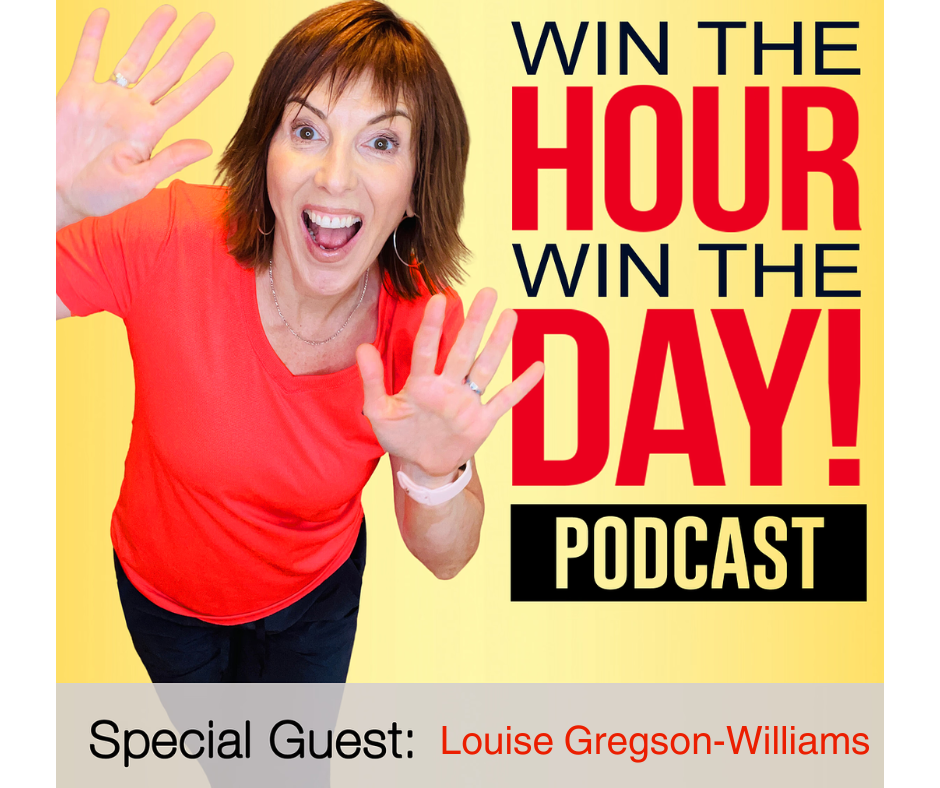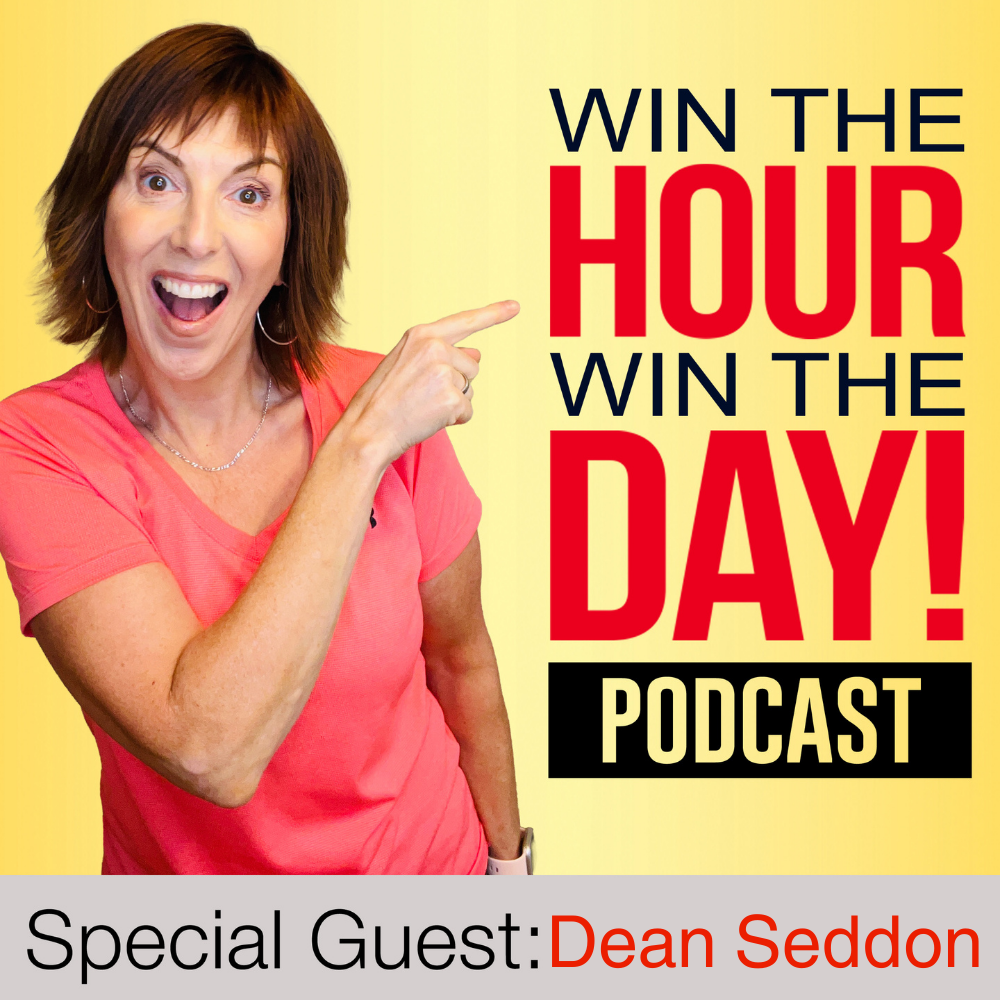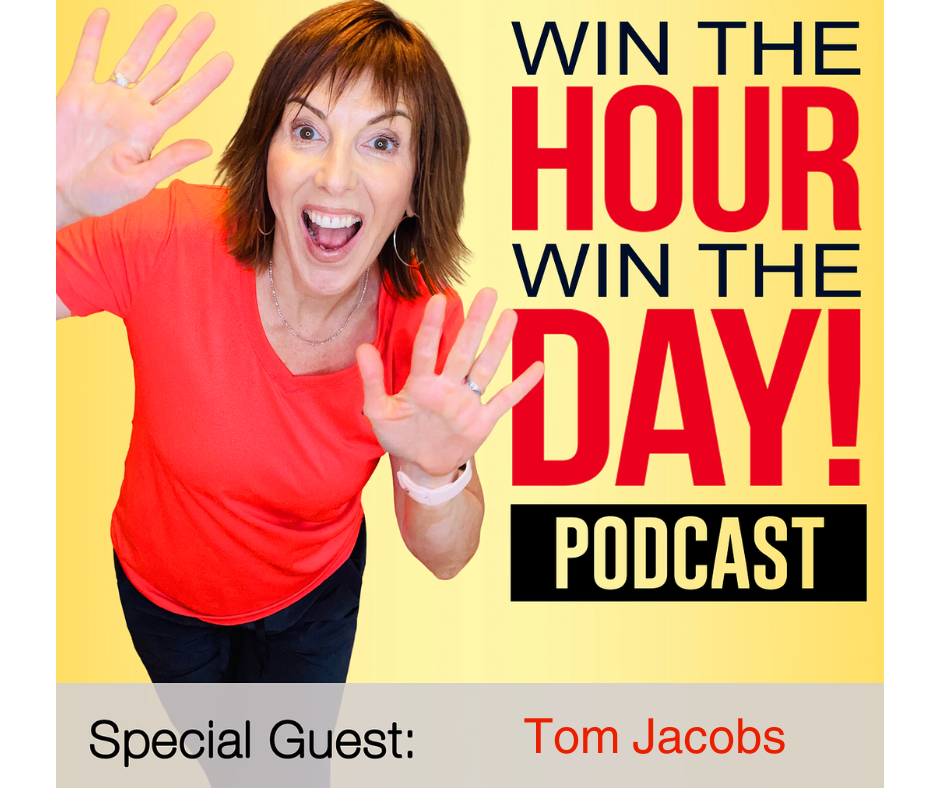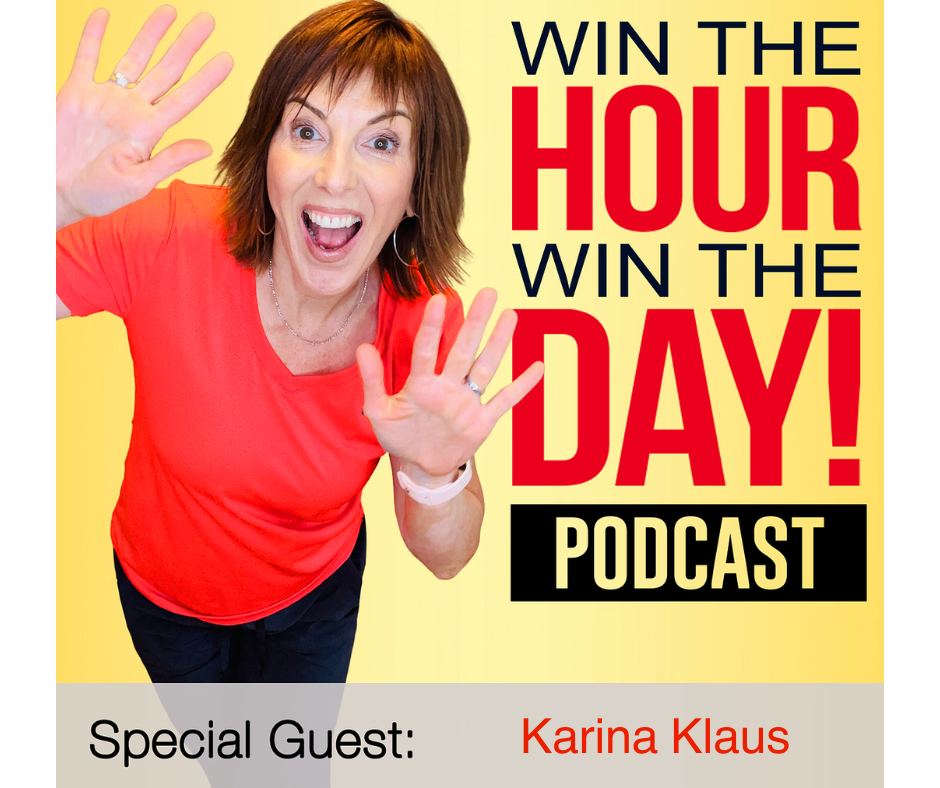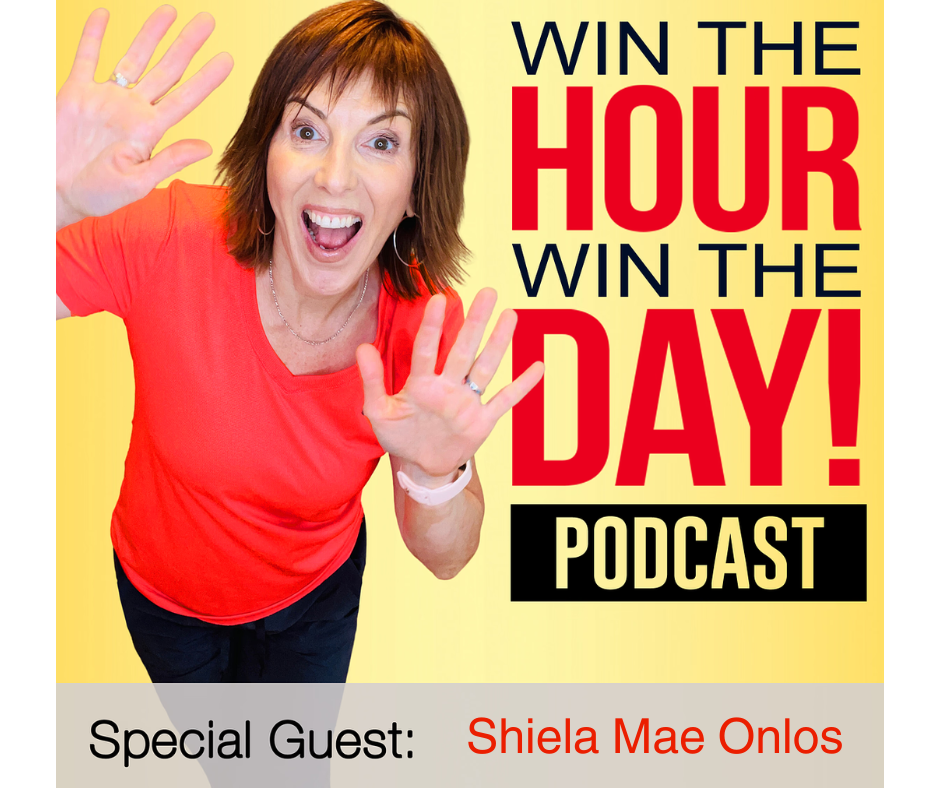Episode Summary
This week’s episode of Win The Hour, Win The Day Podcast interviews, Louise Gregson-Williams.
Are you tired of using big business words that don’t really say what you mean? Join us as Louise Gregson-Williams shares her simple way to make your marketing clear and real with her Think • Feel • Do method.
In this eye-opening talk, you’ll learn:
-Why fancy “corporate” words turn people away.
-How to use simple, grounded language that connects fast.
-What your customers are really thinking, feeling, and doing.
-How to make people say, “That’s me!” when they read your message.
-Why clear words help you stand out and sell more.
Get ready to make your marketing sound human again! Don’t miss this episode—it will change how you talk about your business forever.
Win The Hour, Win The Day! www.winthehourwintheday.com
Podcast: Win The Hour, Win The Day Podcast https://podcasts.apple.com/ca/podcast/win-the-hour-win-the-day/id1484859150
Facebook: https://www.facebook.com/winthehourwintheday/
LinkedIn: https://www.linkedin.com/company/win-the-hour-win-the-day-podcast
You can find Louise Gregson-Williams at:
Substack: https://nosilverbullets.substack.com/
LinkedIn: https://www.linkedin.com/in/louisegregsonwilliams/
Website: www.leapthirtytwo.com
Win The Hour Win The Day
https://winthehourwintheday.com
Louise Gregson – Williams Podcast Transcript
[00:00:00] Kris Ward: Everyone. Welcome to another episode of Win The Hour Win The Day. I am your host, Kris Ward, and today in the house we have Louise Gregson Williams and she is a marketing consultant. And we’re gonna talk today about think, feel, do. Welcome to the show, Louise.
[00:00:16] Louise Gregson-Williams: Hi Kris. So nice to be here. Thank you so much for the invite.
[00:00:19] Kris Ward: Okay, so we’re gonna talk about marketing market messaging and for sure under the umbrella of think, feel, do. So what does that mean? Where do we start?
[00:00:28] Louise Gregson-Williams: Cool. If I just like maybe take you back to where this all started for me because, i’ve just moved house recently and I found my old notebook which has my notes from my first ever interview for a mark, a marketing position B2B software provided company.
[00:00:47] Louise Gregson-Williams: And I was going through it and I realized this is where my fascination with business language started. One of the lines in there was SaaS assignment management system solutions for global mobility. And whoa. I was [00:01:00] like, what does that actually mean? And I remember thinking at the time, am I stupid?
[00:01:05] Louise Gregson-Williams: What does, what is that all about? And as I went through more jobs in marketing and with different businesses and all of this kind of thing, I realized that this was really common. This kind of strange kind of language that businesses started using to describe themselves. And when I started working with clients on like.
[00:01:27] Louise Gregson-Williams: The work that I do now as a consultant, it, it really shone through that they were using all of this kind of weird language. Like they talk about like practical solutions and quality service and next level support and expert advice, and what does that even actually mean, right?
[00:01:45] Kris Ward: Yeah, we’re trying to sound smart and corporate and like you got your big girl or big boy pants on that kind of deal.
[00:01:51] Louise Gregson-Williams: Yeah, for sure. And they were all from different industries doing all different things and they were saying the same things and I just thought, that can’t be [00:02:00] right. That’s not useful to anyone. Okay. Okay. So what is useful? So what we want to move away from is this kind of. Slightly weird, as you say, corporate language, which I don’t actually know where it started or where it began, but I’m thinking maybe around when websites became popular and we started having to write a lot of content.
[00:02:20] Louise Gregson-Williams: Yeah.
[00:02:20] Louise Gregson-Williams: And just content generation, content ma marketing became like the big thing, didn’t it? About 10, 15 years ago. And we want to move away from these kind of weird, like non words, which I call ungrounded language. Okay. And that’s something that was shown to me much later on and into something which is much more grounded and the difference between the two.
[00:02:44] Louise Gregson-Williams: So when we talk about ungrounded language, so it could be, when I talk about trusted service. For example, your experience, your understanding of what a trusted service is compared to my understanding of what a trusted service is, can be [00:03:00] two completely different things.
[00:03:02] Kris Ward: Okay.
[00:03:02] Louise Gregson-Williams: So for example, and luxury experience, for example, like my version of luxury, might be completely different to your version of luxury.
[00:03:10] Louise Gregson-Williams: Yes. And what we can move into is building up a much, much clearer image for the reader or the person that you’re speaking to. This doesn’t have to just be to do with what you’re writing down, but when you’re in a networking event or something like that, and you’re speaking about yourself and what your business does, if we can really paint a picture in the person’s mind, images are more powerful than words, right?
[00:03:33] Kris Ward: Yeah.
[00:03:34] Louise Gregson-Williams: So this is where we can move to and by, there’s loads of different ways of doing this, but I have to be honest with you and say that i’m not a massive fan of like models and theories, especially for our types of businesses. Okay. Because they take so long and we don’t have time for that. Whereas this can take an hour even less, and you can do it very simply. [00:04:00]
[00:04:00] Kris Ward: I think you brought, that’s a powerful example, that luxury like that. It sounds like such, oh, we should say that. It’s a luxury service. What does luxury mean? That is such a wide scope of that is not a luxury for me.
[00:04:12] Kris Ward: That is a luxury I don’t need, we’ll never want that. It just so laden with, personal perception. Okay. So we’re moving from ungrounded to grounded. We wanted to really make these words matter when we’re talking about our messaging and stuff like that. So where do we start with the think, feel, and do?
[00:04:31] Louise Gregson-Williams: So it is a really simple three column structure. So in your the thing that we want to think about is something, what I call the transformation state. So you’re talking about what people are doing right now. So before they find your business what kind of situations, circumstances, et cetera.
[00:04:50] Louise Gregson-Williams: Are they finding themselves in? And then by working with you, what’s the transformation? So what’s the how are they thinking? What are they feeling? What are they doing after they’ve worked with you? So those are the two things that we’re gonna focus on. Okay.
[00:05:03] Kris Ward: So let’s look at that. So the type of clients I work with.
[00:05:07] Kris Ward: There are entrepreneurs that have been in business at least, usually 10 years or so, and they look good on paper. And their biggest problem is that they’re working way too many hours for where they are at this point in their journey. So we help them, we find, hire and onboard virtual assistants, put them on a leadership program, work with the entrepreneurs and really teach them some basic things of how to streamline processes and how
[00:05:30] Kris Ward: to not manage these VAs like the corporate model, which is incredibly broken. So they get time back and you make more money. And all my clients say, their money, their income goes way up. A lot of the personality traits of these people as well. Is they have been so highly effective and efficient and they’re the go-to person for so many people in their world.
[00:05:49] Kris Ward: That then when they get in a situation where they’re working crazy hours and still are, they just assume it can’t be done any differently because I get more dumb than anyone else I know [00:06:00] and I can’t keep up. There’s just too much work to do. So that’s really understanding that instead of speaking in broad scopes.
[00:06:06] Louise Gregson-Williams: A hundred percent. And that is you’ve used some great examples of really grounded language that I haven’t used. So like they’re working more hours than in a day than they think that, than a day has potentially, and they’re feeling all of these types of things and I think what we like want businesses to do is by doing that you are allowing, and when you’re using this type of language, what you are showing is that you really understand the people that you’re speaking to, right?
[00:06:37] Louise Gregson-Williams: And what the situation is that they’re currently in. And then you are showing them an alternative.
[00:06:44] Kris Ward: Okay. Okay.
[00:06:45] Louise Gregson-Williams: All of those things that you’ve described there are just like really great examples of, and you could quite easily put those into think, feel, do categories. If we are looking at this and we’ve just got a three column approach.
[00:06:56] Louise Gregson-Williams: So you’ve got your think column, you’ve got your fill column, and you’ve got your DO [00:07:00] column, and we’re talking about that before state. So if I was talking about my business, one of the things that my clients always say to me is, I have no idea where to start. Okay. That’s one of the things that they’re always thinking about.
[00:07:12] Louise Gregson-Williams: I have no idea where to start. They’re often annoyed, like they often feel annoyed that they’ve been sold an expensive logo on a website, but that hasn’t fixed their client acquisition problem. They’re not getting more clients by doing that.
[00:07:26] Kris Ward: Yeah.
[00:07:26] Louise Gregson-Williams: And they might be doing, they might be relying on word of mouth leads and they’re no longer getting them.
[00:07:32] Louise Gregson-Williams: So that’s the type of thing. And what you can do is, I always say to businesses that I work with and the clients that I work with, that they know everything that they need to know right now in order to market their business effectively. We have this impression so often that we need to do more, we need to do the next thing in order to be able to speak to the people that we actually know quite well, like in business, especially if I [00:08:00] think as you’re saying, like with your clients, a lot of them have been in business a while.
[00:08:04] Louise Gregson-Williams: They ne they will know their CU customers, right? And therefore this activity is actually really quite easy because all you need to do is think back to those conversations that you’ve had, the things that clients have said to you and the situations that they’ve been in, and be able to just categorize, okay, this is what they’re thinking, this is what they’re feeling and this is what they’re doing right now.
[00:08:26] Louise Gregson-Williams: And then when they work with me. These, the, this is the transformation. This is the change that they’ve told me about. The now they’re thinking about these things. They’re doing these things and they’re feeling these things.
[00:08:38] Kris Ward: Okay. So the think feel do is not just identifying the problem and the pain point.
[00:08:42] Kris Ward: But it will take us through all aspects of the journey. So the think, feel, do the thinking is okay. My clients think, oh my gosh, there’s just more than can be done. Because if normally I can get more done than anybody else, and so if I can’t, there’s just too much to get done. Whereas now, after working with me [00:09:00] with the transformation and all that we do with them.
[00:09:02] Kris Ward: The thinking is, oh my gosh. I really feel in control of my next project. I know I can bring on something, execute it, get it done, move on to the next thing. I feel a sense of control. I’ve fell back in love with my business. I started to spend more time with my friends and family. There is a flow to what I’m doing and a space and a breath instead of me always juggling and spinning plates.
[00:09:23] Kris Ward: So we’re gonna take them. Anything we take them through, we should be able to lean into the think field do.
[00:09:28] Louise Gregson-Williams: Yeah, for sure. Sure.
[00:09:29] Kris Ward: Okay.
[00:09:30] Louise Gregson-Williams: And I think that what gets missed so much when we when I’m looking at language and things that my clients are using to describe themselves is that they miss that kind of they hide behind these terms.
[00:09:43] Louise Gregson-Williams: Oh, we provide a really good service.
[00:09:45] Louise Gregson-Williams: But what does that look like for me? Does it mean that you are going to be on Slack. Five days a week. What is the grounded, what does that look like when you tell me that’s a great service?
[00:09:58] Kris Ward: Or even if I said we help service based [00:10:00] businesses get time back.
[00:10:01] Kris Ward: How much time and what kind of service? And it’s all okay, that’s nice, but you don’t understand me because I get a lot done, and I’m struggling with this, so I, yeah, I think it, you’re right. It’s not, that’s the best compliment when somebody says to you, oh my gosh, Kris, you’re in my head.
[00:10:16] Kris Ward: You know me. So I think it really lends itself to that think, feel, do. You absolutely you’re in my head. That’s exactly how I feel. Now what really, frankly, what do I do? Whereas when we try to sound professional and we lean on the corporate model, which is just say a lot, but mean little or try to cover.
[00:10:34] Kris Ward: As many people as you can with a generic statement. We help service-based businesses, established service-based businesses get time back. Okay, great. That’s lovely. Thank you.
[00:10:44] Louise Gregson-Williams: But actually what you’re doing is you are giving those people more space to take on more business and do all of these like really like crucial things.
[00:10:54] Kris Ward: Yeah.
[00:10:54] Louise Gregson-Williams: Getting time back is great. What does it mean in their world? Because yeah, [00:11:00] you,
[00:11:00] Kris Ward: what are you gonna do with that time?
[00:11:01] Louise Gregson-Williams: Exactly what you gonna do with that time? What does it enable you to do? Does it enable you to have a day, a week of fun, a week? Like whatever that looks like it does, it give you a day, a week back to be with your kids or your family or whatever it is.
[00:11:14] Louise Gregson-Williams: So yeah, so I think when we get like really granular in terms of, okay, what is it that, that, what is it that you do? Why do you do it and who do you do it for? In terms of the think feel do we are gonna be so much more confident, right? Not just writing in our content, like when it comes to LinkedIn or whatever you go, whatever marketing lever you are pulling or promotional lever you’re putting.
[00:11:39] Louise Gregson-Williams: But also I think it’s so important, like being able to actually speak about it as well because we can hide behind content, et cetera in terms of writing. But when you are really sure. When you’re speaking to a new client, you can be like, look, these are the, this is the transformation that I make for my [00:12:00] clients.
[00:12:00] Louise Gregson-Williams: This is what you might be feeling. Now, these are the types of things, right? Someone that I work with on my business he always talks to me about pattern recognition and what you are doing. By showing that you really think, feel, and do, and what you understand about them is that you are showing that you have that pattern recognition of their specific set of circumstances.
[00:12:21] Louise Gregson-Williams: And then you’re showing again, your your, the way that you can. The way that you can make those changes on a kind of a repetitive basis.
[00:12:34] Kris Ward: And I think for so many of us, how many times have we all heard like either people think they’re unique or their business is unique. Yeah. And I often tell my clients, you may be unique, but you may be special, but you’re not unique.
[00:12:43] Kris Ward: Because a hundred percent what will happen is they’ll think, oh, Kris, you don’t understand. I’m the go-to person in my life. I get a lot done. Nobody can get it done as much as me. And I’m like, yeah, I get it. That’s exactly the type of client I serve. And you may have a client coming to you.
[00:12:57] Kris Ward: That’s so frustrated and just [00:13:00] disgruntled by the fact they spent all that much money on a logo and then it didn’t serve them and they think they’re the only one that made that mistake, right? So I think your think field do then it also really hammers down and tethers that to something like, this is a real and a specific problem, and I understand that instead of sweeping it under some sort of generic business mission statement.
[00:13:24] Louise Gregson-Williams: For sure. Where we become so abstract
[00:13:27] Kris Ward: Yeah.
[00:13:27] Louise Gregson-Williams: That it becomes completely meaningless. For sure. And I think what ultimately you are aiming for with anything that you do is you want someone to sit back and say, ah, that’s me. Yeah, that’s me. They understand me and therefore they must know how to help me or how to support me, make that change.
[00:13:49] Louise Gregson-Williams: ‘Cause they’ve seen it, they understand it. And these are all the behaviors that I’m doing, all the things that I’m experiencing. So therefore, if they really [00:14:00] understand me at this point, at this juncture, then maybe they can show me. Yeah, what the potential solution is.
[00:14:08] Kris Ward: Yeah.
[00:14:09] Louise Gregson-Williams: To use an ungrounded word.
[00:14:11] Kris Ward: Yeah, I get it. Yeah. Okay so what? So yeah, there’s so much here. So under these things let’s lean a little bit. We got that. We talked a lot about the think and a little bit about the feel. What about the do.
[00:14:23] Louise Gregson-Williams: So these are like, so one of, for example these are things where like they’re active states of what people might actually be doing.
[00:14:31] Louise Gregson-Williams: So one of the things that comes out a lot with clients, so I was working with one of my accountancy clients, they’re Googling because they work in expat accountancy. So they’re googling, do I need a, a, an accountant in the UK and an accountant in the US. Like those are the types of things, activities that these people, and what that also does is not just..
[00:14:55] Louise Gregson-Williams: Not just helps clarify the activity. So when you’re [00:15:00] speaking to them, the activities that they’re doing also gives you a bit of insight yourself as to where, and this is going into slightly other territory, but where those clients are potentially hanging out. So if they’re like Googling stuff, then maybe you wanna look at search ads, et cetera.
[00:15:15] Louise Gregson-Williams: So you are also like garnering and collating that other information about the types of activities that those clients are potentially doing and thinking about, okay, what next marketing lever can I pull in order to find more of those types of clients doing those types of things.
[00:15:32] Kris Ward: Okay. So I was think the do was on our behalf.
[00:15:35] Kris Ward: I see. We were looking to see what they’re doing. Okay. That’s different. Yeah. Yeah. I had that wrong. Okay.
[00:15:40] Louise Gregson-Williams: Yeah, really understanding, for example, they are investing thousands. ’cause I’ve had clients doing this, investing thousands in quick fixes that have no impact on their sales, right?
[00:15:52] Louise Gregson-Williams: So for example, I have one client who just invested loads in kind of Instagram, YouTube. [00:16:00] Everything, like all of these types of things. And that’s really common in the clients that I work with. So when I’m speaking to those those types of people, I’ll be like, okay, have you invested loads of money in lots of different things and none of it seems to be working for you.
[00:16:15] Louise Gregson-Williams: So then. I could be like, okay, this is what I would recommend, that actually doing too many things. That makes sense.
[00:16:22] Kris Ward: So for my people, either they haven’t had a VA because they think it’ll be too much work, I don’t have the time to do that and babysit and all this stuff. Or they’ve had them and it didn’t work out and they burned through several because they weren’t set up effectively.
[00:16:34] Kris Ward: They then they try different services or different touch points of price or all these different things. And that’s not the problem. The problem is they’re not set up properly. So have you done this? And these are some of the symptoms of your problem. I got it. Okay. Yeah, for sure.
[00:16:47] Louise Gregson-Williams: Yeah. And I think the do one, as I said, can be really powerful because it actually, it actually gives you potentially insight into where you can find more of those people as well. Sure. It [00:17:00] can be just a really useful, not just to speak to them about what it is that they’re doing, but actually from a strategy perspective.
[00:17:07] Louise Gregson-Williams: Which is what I do when I’m working with clients. Like it actually helps you to find where they could be hanging more new clients could be hanging out.
[00:17:15] Kris Ward: Okay. Oh, interesting. Alright, so we got think, feel, do anything else here that we’re missing?
[00:17:24] Louise Gregson-Williams: I think just to maybe paint a really clear picture about that, about the impact of that language.
[00:17:31] Louise Gregson-Williams: So if I said to you Kris, I’m a house builder. What would your initial reaction, what would you think of that’s probably the…
[00:17:40] Kris Ward: it’s pretty broad. I guess I would I don’t know. I have you picturing standing in front of a house frame, but I don’t know, do you build one at a time?
[00:17:47] Kris Ward: Who do you build them for? What part of the building do you do do you build at all? I don’t know.
[00:17:52] Louise Gregson-Williams: Yeah, and like I have a lot of questions. You’ve got so many questions of an individual and so then if I said to you, actually I [00:18:00] build hobbit houses for people with furry feet and that have got they’ve got, they’re vertically challenged.
[00:18:04] Louise Gregson-Williams: They can’t reach the things and the shelves and all of that kind of stuff that I build round windows and round doors and all of that kind of thing. That’s a very different.
[00:18:14] Louise Gregson-Williams: It’s a very different experience to just, I’m a house builder because actually I know who you are for now and what the difference is between you and someone else.
[00:18:22] Louise Gregson-Williams: What I see a lot with clients is that they’ll look at especially if they’re in a crowded kind of marketplace in terms of the business that they do. So one of my clients is a web developer. And their market is very crowded. They do a lot of Shopify work and it’s very tempting in those crowded marketplaces to look at everyone else and just be looking about everywhere.
[00:18:48] Louise Gregson-Williams: And you’re like, oh, but I’m not saying that they’re saying this, and all of this kind of stuff. And then you just start copycatting. What everyone else is saying,
[00:18:57] Kris Ward: you think you’re missing something. ’cause they say it and you don’t [00:19:00] say it, but then you’re just gab. It’s almost like a flea market. You’re going around getting pieces of information from everybody, but then none of it’s you.
[00:19:06] Louise Gregson-Williams: Exactly. Yeah. And that, that happens so often and there’s a core piece of work to do about who it is that you’re trying to target. Of course. Being able to like really latch onto some grounded language in terms of what people are thinking, what they’re feeling, and what they’re doing.
[00:19:22] Louise Gregson-Williams: Your customers, okay not everyone else’s. What do your customers need? You can often make yourself sound different by showing that you really understand their situation. Okay. Because yeah, we can use all of this kind of high level language, and you’ll see if you look at your the people that are in your business area, in your industry,
[00:19:47] Kris Ward: yeah. Yeah.
[00:19:48] Louise Gregson-Williams: And you look at their websites and things, you’ll see probably quite a lot of this kind of high level solution based languages being used. So if you are able to really [00:20:00] hone in on the actual things that people are experiencing, it will give you a completely different thing to talk about. Whereas, relying on that
[00:20:10] Kris Ward: kind of, and you’re dealing no fluff and results, which is I’m passionate about that.
[00:20:13] Kris Ward: And I think too, what happens, it’s like when people say, I have to, oh, you know what? We have to work on a mission statement from our business. I’m like, who? Why? Why do you have to? Who cares? If you’re like, I don’t know, a huge organization and you’re branching off into nonprofit and you’re sending shoes to a third world country, okay, maybe the thousands of people that work with, you wanna have a governing mission statement, but you do not need that with you and your no support or maybe one VA, right?
[00:20:38] Kris Ward: So I think you’re right. We start to try to sound smart, sound, academic, do all these things for business. But it’s not it’s just not helping us. It’s not retaining or getting new business.
[00:20:49] Louise Gregson-Williams: No. And that’s exactly it. Like we do, and this is why I’m often not a fan of like theories and things like that.
[00:20:56] Louise Gregson-Williams: Yeah. ’cause actually there’s so [00:21:00] removed from what it is that you have to be doing day to day. If I do a mission statement. Is that gonna get me any sales? Is that gonna, is that gonna get me in a room with someone that I want to be in the room with? Why am I doing stuff that people can’t see?
[00:21:14] Kris Ward: And I think it’s busy work.
[00:21:16] Kris Ward: I had a client say that to me and she was struggling with something and her sales are down and we’re working on her systems and her VA’s all working out. So now she’s got more time to get the real work done and she’s oh, I wanna bring in more traffic and I’m having a hard time.
[00:21:26] Kris Ward: I’m frustrated on LinkedIn. I think I’ll really work on my mission statement. I’m like. That’s just kicking the can down the road. Get on LinkedIn today, talk to some people, have a conversation like start there, not let me pull back and then try to get all this glossy content and mission statements and revamp my brochures based on nothing.
[00:21:45] Kris Ward: For sure.
[00:21:46] Louise Gregson-Williams: The reason I left my last job is because everything took too long. Yeah. So we were looking at doing six to 12 months for a marketing strategy. Can you imagine trying to do that with the… a business of.
[00:21:59] Kris Ward: Yeah. [00:22:00] And the whole world has changed in the next eight months. So you’re like, when you get the strategy, who cares?
[00:22:04] Kris Ward: That’s outdated now. Oh my gosh. Okay. Louise, where can we find more of your brilliance?
[00:22:10] Louise Gregson-Williams: Had to LinkedIn okay. Louise Gregson Williams. I’m on that, but you can also find me on Substack. I have a substack called No Silver Bullets.
[00:22:20] Kris Ward: Okay.
[00:22:20] Louise Gregson-Williams: And it’s all about debunking marketing myths and finding the reassurance that you need in a world of partic, particularly bro marketing, that what you’re doing is probably okay.
[00:22:33] Kris Ward: Oh my gosh. Okay. Alright, everyone, please share this with a business buddy. Don’t let them bang around there by themselves and we will see you in the next episode. Thank you so much, Louise.
[00:22:43] Louise Gregson-Williams: Thank you so much.

